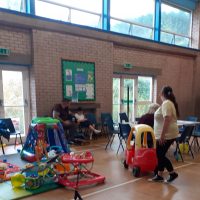During February the coronavirus pandemic started to make itself felt in the UK and we soon had to take some tough decisions. After Sunday worship on 15th March we cancelled all services and meetings for the time being. During the week we contacted all hall user groups; most of them had already decided to stop meeting and we asked the few outstanding groups to cancel their meetings so we could comply with government guidance and close the premises. So now the whole building stands locked up. But the garden is coming to life, with magnolia trees in bloom, bees beginning to investigate the opening flowers and birds raiding the seed holders and investigating the new nesting boxes.
As the building is not in use, we are not consuming gas, electricity or water so the carbon footprint of the premises is dropping. People are not driving to church or to group meetings, so the carbon footprint of the members of our user groups is also reducing. In the wider world, we read that pollution in our towns and cities has reduced dramatically, so too has noise pollution from traffic, and the massive reduction in air travel has led to clearer skies.
Ecologists are warning us that our global consumer lifestyle is in part to blame for the rise in diseases crossing from animals to humans and circulating rapidly through populations. It is more than time for us to reflect with humility on the destructive habits of humanity and the disruption we cause to the delicate balance of the ecosystem. As Christians, as we face up to the biggest challenge of our generation, we are called to repent and start again. Being an Eco-Church challenges us anew






